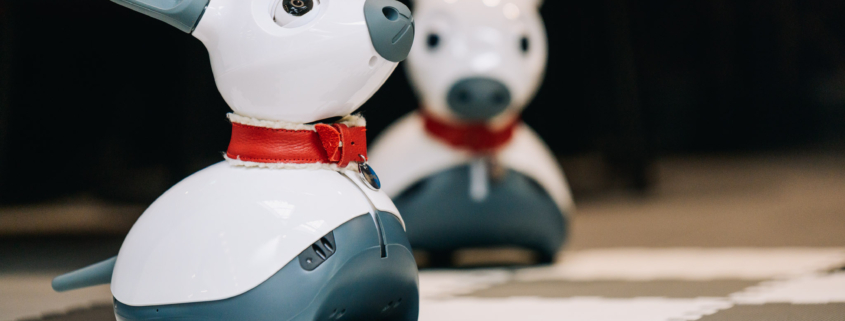Anthropomorphic to Zoomorphic Social Robots: Our Experiences – Wed 22 May, 1200-1300
Prof. Dr. Patrick C. K. Hung, Faculty of Business and IT, Ontario Tech University, Canada is speaking at the National Robotarium on 22 May.
Join us in the Atrium space from 12-1pm for an insightful talk on the social impacts of anthropomorphic and zoomorphic robots.
No booking required
Abstract
A social robot consists of a physical hardware component that interacts with humans connected through a network infrastructure as a cyber-physical computing system supported by cloud services. Human-robot interaction (HRI) is a research area that involves understanding, designing, and evaluating robots for use by or with humans. The Uncanny Valley theory describes the disturbing effect of imperfect human likenesses that have dominated HRI.
Referring to the Uncanny Valley, social robots usually constitute a form of anthropomorphism. Social robots typically behave like humans or animals, such as mimicry of human/animal behavior and emotional expression, with speech, gestures, movements, and eye-gaze features. Prior research found that it is much easier for an embodied humanoid robot with emotional expression to gain users’ trust to release personal information than a disembodied interactive kiosk. Emotions are essential to human cognition and behavior caused by an identifiable source, such as an event or seeing emotions in other people. During the pandemic, our research team designed and built a homemade robotic puppy with wood and mechatronics with a mechanical tail to express emotion from scratch with body language. This talk will then overview our social-technical research works from anthropomorphic to zoomorphic robots. This talk will also focus on a recent study of a guide dog robot for people with visual impairments in Canada.
Speaker Bio
Patrick C. K. Hung is a Professor and Graduate Program Director of Computer Science at Ontario Tech University, Faculty of Business and Information Technology. He is a Leverhulme Visiting Professor at Aston University, England, and an Honorable Guest Professor at Shizuoka University, Hamamatsu, Japan. He was also a Distinguished Visiting Fellow at Abertay University, Scotland, and a Visiting Researcher at the University of São Paulo, Brazil. Dr. Hung worked with Boeing Research and Technology in Seattle on aviation services-related research with two U.S. patents on the mobile network dynamic workflow system. Before that, he was a Research Scientist with Australia’s Commonwealth Scientific and Industrial Research Organization. He is a founding member of the IEEE Technical Committee on Services Computing and IEEE Transactions on Services Computing. In addition, he is an editorial board member for the IEEE Transactions on Engineering Management and a coordinating editor of the Information Systems Frontiers. He has a Ph.D. and Master in Computer Science from the Hong Kong University of Science and Technology, a Master in Management Sciences from the University of Waterloo, Canada, and a Bachelor in Computer Science from the University of New South Wales, Australia.







